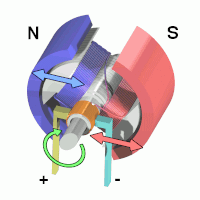
Photo from wikipedia
This paper investigates the cogging torque caused by manufacturing tolerances through analytical, finite element analysis (FEA), and experimental methods. Based on experiments, it is found that the stator and rotor… Click to show full abstract
This paper investigates the cogging torque caused by manufacturing tolerances through analytical, finite element analysis (FEA), and experimental methods. Based on experiments, it is found that the stator and rotor tolerances of PM motor generate low-frequency components of cogging torque, such as the multiples of rotor pole and stator slot numbers. First, analytical calculation is used to find out the frequency spectrum components of the cogging torque. Then, FEA is used to confirm the analytical results and to determine which tolerances play dominant role on causing these components. Furthermore, the sensitivities of the key tolerances are illustrated. These can provide the designer a direction to design a motor with low sensitivity to tolerances. Because the tolerances of stator and rotor stacks are from stamping die, these tolerances are almost constant. A simple manufacturing method, i.e., rotation lamination, is proposed to manufacture the improved stator and rotor stacks. After using the proposed method, the effects of stator and rotor tolerances are individually validated through experiments.
Journal Title: IEEE Transactions on Industrial Electronics
Year Published: 2018
Link to full text (if available)
Share on Social Media: Sign Up to like & get
recommendations!